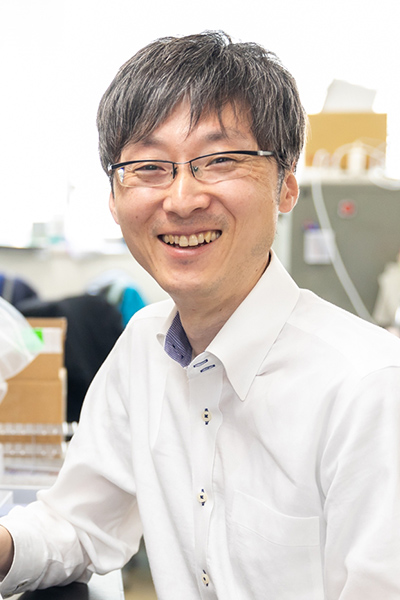
Education
- Faculty of Pharmaceutical Sciences, Hokkaido University (Degree: Bachelor)
- Division of Medical Sciences, Graduate School of Medicine, Hokkaido University (Degree: Master)
- Division of Medicine, Graduate School of Medicine, Hokkaido University (PhD)
Professional Experience
- 2009-2012: Hokkaido University, Graduate School of Medicine, JSPS Research Fellowship for Young Scientists
- 2014-2015: National Institutes of Health (NIH), National Institute of Allergy and Infectious Diseases, Postdoctoral Fellowship of the Japan Society for the Promotion of Science (JSPS)
- 2012-2017: National Institutes for Health (NIH), National Institute of Allergy and Infectious Diseases, Visiting Fellow
- 2017-2019: Foundation for Biomedical Research and Innovation (FBRI), Institute of Biomedical Research and Innovation, Researcher
- 2017-2020: Kyoto University, Graduate School of Medicine, Assistant Professor
- 2019-2020: Foundation for Biomedical Research and Innovation (FBRI), Institute for Biomedical Research and Innovation, Senior Investigator
- 2021~: Senior Lecturer, Division of Integrated High-Order Regulatory Systems, Center for Cancer Immunotherapy and Immunobiology (CCII)
Research Focus
Our scientific goal is to understand how the immune system is regulated by the crosstalk with multilayers of high-order systems, and to develop a better therapeutical application to treat immune disorders for a longer health span. Modern life has improved our living standards in exchange for metabolic stress exposure through our daily diet, circadian rhythm, and so on. These series of metabolic stress can potentially be imprinted into our immune system which may persist as a life-long risk for developing immune disorders in our later stage of life. The imprinting of metabolic stress may take place in multilayers (genome, epigenome, metabolome, proteome), therefore we commit ourselves to dive into omics data to look for the footprints of these imprinted stress. Better understanding of these information will give us high-resolution clues about what we can target to make immune therapy a better choice for patients with immune-related disorders such as cancer and autoimmune diseases.
Selected Publications
Chamoto K, Zhang B, Tajima M, Honjo T, Fagarasan S. Spermidine – an old molecule with a new age-defying immune function. (2023) Trends Cell Biol. S0962-8924(23)00166-6. DOI: https://doi.org/10.1016/j.tcb.2023.08.002
Kenji Chamoto, Tomonori Yaguchi, Masaki Tajima, Tasuku Honjo. Insights from a 30-year journey: function, regulation and therapeutic modulation of PD1. Nature Reviews Immunology. 2023. DOI: https://doi.org/10.1038/s41577-023-00867-9
Suzuki K., Tajima M, Tokumaru Y, Oshiro Y, Nagata S, Kamada H, Kihara M, Nakano K, Honjo T, Ohta A. Anti-PD-1 antibodies recognizing the membrane-proximal region are PD-1 agonists that can down-regulate inflammatory diseases, Sci Immunol. 2023 Jan 13;8(79):eadd4947. DOI: https://doi.org/10.1126/sciimmunol.add4947
Muna Al-Habsi, Kenji Chamoto, Ken Matsumoto, Norimichi Nomura, Baihao Zhang, Yuki Sugiura, Kazuhiro Sonomura, Aprilia Maharani, Yuka Nakajima, Yibo Wu, Yayoi Nomura, Rosemary Menzies, Masaki Tajima, Koji Kitaoka, Yasuharu Haku, Sara Delghandi, Keiko Yurimoto, Fumihiko Matsuda, So Iwata, Toshihiko Ogura, Sidonia Fagarasan, Tasuku Honjo. Spermidine activates mitochondrial trifunctional protein & improves antitumor immunity in mice, Science 378(6618) eabj3510 Oct 28, (2022). DOI: https://www.science.org/doi/10.1126/science.abj3510
Wang G, Tajima M, Honjo T, Ohta A. STAT5 interferes with PD-1 transcriptional activation & affects CD8+ T-cell sensitivity to PD-1-dependent immunoregulation. Int Immunol. 2021 Oct 29;33(11):563-572. DOI: doi.org/10.1093/intimm/dxab059
Ashoori MD, Suzuki K, Tokumaru Y, Ikuta N, Tajima M, Honjo T, Ohta A. Inactivation of the PD-1-Dependent Immunoregulation in Mice Exacerbates Contact Hypersensitivity Resembling Immune-Related Adverse Events. Front Immunol. 2021 Jan 27;11:618711. DOI: 10.3389/fimmu.2020.618711
TTakagawa T, Kitani A, Fuss I, Levine B, Brant SR, Peter I, Tajima M, Nakamura S, Strober W. An increase in LRRK2 suppresses autophagy & enhances Dectin-1-induced immunity in a mouse model of colitis. Sci Transl Med. 2018 Jun 6;10(444):eaan8162. DOI: 10.1126/scitranslmed.aan8162
Satoh T, Tajima M, Wakita D, Kitamura H, Nishimura T. The development of IL-17/IFN-γ-double producing CTLs from Tc17 cells is driven by epigenetic suppression of Socs3 gene promoter. Eur J Immunol. 2012 Sep;42(9):2329-42. DOI: https://doi.org/10.1002/eji.201142240
Tajima M, Wakita D, Satoh T, Kitamura H, Nishimura T. IL-17/IFN-γ double producing CD8+ T (Tc17/IFN-γ) cells: a novel cytotoxic T-cell subset converted from Tc17 cells by IL-12. Int Immunol. 2011 Dec;23(12):751-9. DOI: 10.1093/intimm/dxr086
Tajima M, Wakita D, Noguchi D, Chamoto K, Yue Z, Fugo K, Ishigame H, Iwakura Y, Kitamura H, Nishimura T. IL-6-dependent spontaneous proliferation is required for the induction of colitogenic IL-17-producing CD8+ T cells. J Exp Med. 2008 May 12;205(5):1019-27. DOI: 10.1084/jem.20071133
